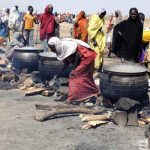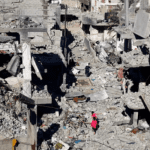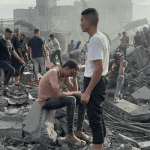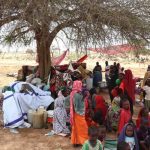Aid organisations are considering providing aid to Sudan via a new route from South Sudan as they struggle to reach much of the country, according to a top UN official, nine months into a war that has resulted in a massive humanitarian crisis.
The conflict between the army and the paramilitary Rapid Support Forces (RSF) has resulted in nearly half of Sudan’s 49 million people requesting assistance.
Sudan has the world’s largest displacement problem, with over 7.5 million people fleeing their homes, and hunger is on the rise.
Aid supplies have been robbed, and humanitarian workers have been attacked, while international agencies and non-governmental organizations (NGOs) have long complained about bureaucratic barriers to entering the army-controlled hub of Port Sudan and obtaining travel permits to other parts of the country.
Aid agencies lost access to Wad Madani, a former aid hub in the important El Gezira agricultural region southeast of Khartoum, after the RSF seized it from the army last month.
The RSF’s advance into El Gezira state and fighting that erupted recently involving the army, the RSF and Sudan’s third-most powerful military force, the SPLM-North, in South Kordofan, have sparked new displacement.
U.N. and other agencies have been largely restricted to operating out of Port Sudan on the Red Sea coast, and delivering aid from Chad into the western region of Darfur, where there have been waves of ethnically-driven killings.
Health services, already badly weakened when the war broke out in mid-April, have been further eroded.
Diplomats and aid workers say that the army and officials aligned with it have hampered humanitarian access as both sides pursue their military campaigns.
Activists say neighbourhood volunteers have been targeted.
They say the RSF does little to protect aid supplies and workers, and that its troops have been implicated in cases of looting.
Both sides have denied impeding aid.
The army and the RSF shared power with civilians after a popular uprising in 2019, staged a coup together in 2021, then came to blows over their status in a planned transition towards elections.
U.N. humanitarian chief Martin Griffiths said in a statement last week that the reasons aid was not getting through were “frankly outrageous”.
Customs clearances for supplies coming into the country could take up to 18 days, with further inspections under military supervision that could take even longer, he said.
Aid organisations are considering providing aid to Sudan via a new route from South Sudan as they struggle to reach much of the country, according to a top UN official, nine months into a war that has resulted in a massive humanitarian crisis.
The conflict between the army and the paramilitary Rapid Support Forces (RSF) has resulted in nearly half of Sudan’s 49 million people requesting assistance.
Sudan has the world’s largest displacement problem, with over 7.5 million people fleeing their homes, and hunger is on the rise.
Aid supplies have been robbed, and humanitarian workers have been attacked, while international agencies and non-governmental organizations (NGOs) have long complained about bureaucratic barriers to entering the army-controlled hub of Port Sudan and obtaining travel permits to other parts of the country.
Aid agencies lost access to Wad Madani, a former aid hub in the important El Gezira agricultural region southeast of Khartoum, after the RSF seized it from the army last month.
The RSF’s advance into El Gezira state and fighting that erupted recently involving the army, the RSF and Sudan’s third-most powerful military force, the SPLM-North, in South Kordofan, have sparked new displacement.
U.N. and other agencies have been largely restricted to operating out of Port Sudan on the Red Sea coast, and delivering aid from Chad into the western region of Darfur, where there have been waves of ethnically-driven killings.
Health services, already badly weakened when the war broke out in mid-April, have been further eroded.
Diplomats and aid workers say that the army and officials aligned with it have hampered humanitarian access as both sides pursue their military campaigns.
Activists say neighbourhood volunteers have been targeted.
They say the RSF does little to protect aid supplies and workers, and that its troops have been implicated in cases of looting.
Both sides have denied impeding aid.
The army and the RSF shared power with civilians after a popular uprising in 2019, staged a coup together in 2021, then came to blows over their status in a planned transition towards elections.
U.N. humanitarian chief Martin Griffiths said in a statement last week that the reasons aid was not getting through were “frankly outrageous”.
Customs clearances for supplies coming into the country could take up to 18 days, with further inspections under military supervision that could take even longer, he said.
Aid organisations are considering providing aid to Sudan via a new route from South Sudan as they struggle to reach much of the country, according to a top UN official, nine months into a war that has resulted in a massive humanitarian crisis.
The conflict between the army and the paramilitary Rapid Support Forces (RSF) has resulted in nearly half of Sudan’s 49 million people requesting assistance.
Sudan has the world’s largest displacement problem, with over 7.5 million people fleeing their homes, and hunger is on the rise.
Aid supplies have been robbed, and humanitarian workers have been attacked, while international agencies and non-governmental organizations (NGOs) have long complained about bureaucratic barriers to entering the army-controlled hub of Port Sudan and obtaining travel permits to other parts of the country.
Aid agencies lost access to Wad Madani, a former aid hub in the important El Gezira agricultural region southeast of Khartoum, after the RSF seized it from the army last month.
The RSF’s advance into El Gezira state and fighting that erupted recently involving the army, the RSF and Sudan’s third-most powerful military force, the SPLM-North, in South Kordofan, have sparked new displacement.
U.N. and other agencies have been largely restricted to operating out of Port Sudan on the Red Sea coast, and delivering aid from Chad into the western region of Darfur, where there have been waves of ethnically-driven killings.
Health services, already badly weakened when the war broke out in mid-April, have been further eroded.
Diplomats and aid workers say that the army and officials aligned with it have hampered humanitarian access as both sides pursue their military campaigns.
Activists say neighbourhood volunteers have been targeted.
They say the RSF does little to protect aid supplies and workers, and that its troops have been implicated in cases of looting.
Both sides have denied impeding aid.
The army and the RSF shared power with civilians after a popular uprising in 2019, staged a coup together in 2021, then came to blows over their status in a planned transition towards elections.
U.N. humanitarian chief Martin Griffiths said in a statement last week that the reasons aid was not getting through were “frankly outrageous”.
Customs clearances for supplies coming into the country could take up to 18 days, with further inspections under military supervision that could take even longer, he said.
Aid organisations are considering providing aid to Sudan via a new route from South Sudan as they struggle to reach much of the country, according to a top UN official, nine months into a war that has resulted in a massive humanitarian crisis.
The conflict between the army and the paramilitary Rapid Support Forces (RSF) has resulted in nearly half of Sudan’s 49 million people requesting assistance.
Sudan has the world’s largest displacement problem, with over 7.5 million people fleeing their homes, and hunger is on the rise.
Aid supplies have been robbed, and humanitarian workers have been attacked, while international agencies and non-governmental organizations (NGOs) have long complained about bureaucratic barriers to entering the army-controlled hub of Port Sudan and obtaining travel permits to other parts of the country.
Aid agencies lost access to Wad Madani, a former aid hub in the important El Gezira agricultural region southeast of Khartoum, after the RSF seized it from the army last month.
The RSF’s advance into El Gezira state and fighting that erupted recently involving the army, the RSF and Sudan’s third-most powerful military force, the SPLM-North, in South Kordofan, have sparked new displacement.
U.N. and other agencies have been largely restricted to operating out of Port Sudan on the Red Sea coast, and delivering aid from Chad into the western region of Darfur, where there have been waves of ethnically-driven killings.
Health services, already badly weakened when the war broke out in mid-April, have been further eroded.
Diplomats and aid workers say that the army and officials aligned with it have hampered humanitarian access as both sides pursue their military campaigns.
Activists say neighbourhood volunteers have been targeted.
They say the RSF does little to protect aid supplies and workers, and that its troops have been implicated in cases of looting.
Both sides have denied impeding aid.
The army and the RSF shared power with civilians after a popular uprising in 2019, staged a coup together in 2021, then came to blows over their status in a planned transition towards elections.
U.N. humanitarian chief Martin Griffiths said in a statement last week that the reasons aid was not getting through were “frankly outrageous”.
Customs clearances for supplies coming into the country could take up to 18 days, with further inspections under military supervision that could take even longer, he said.
Aid organisations are considering providing aid to Sudan via a new route from South Sudan as they struggle to reach much of the country, according to a top UN official, nine months into a war that has resulted in a massive humanitarian crisis.
The conflict between the army and the paramilitary Rapid Support Forces (RSF) has resulted in nearly half of Sudan’s 49 million people requesting assistance.
Sudan has the world’s largest displacement problem, with over 7.5 million people fleeing their homes, and hunger is on the rise.
Aid supplies have been robbed, and humanitarian workers have been attacked, while international agencies and non-governmental organizations (NGOs) have long complained about bureaucratic barriers to entering the army-controlled hub of Port Sudan and obtaining travel permits to other parts of the country.
Aid agencies lost access to Wad Madani, a former aid hub in the important El Gezira agricultural region southeast of Khartoum, after the RSF seized it from the army last month.
The RSF’s advance into El Gezira state and fighting that erupted recently involving the army, the RSF and Sudan’s third-most powerful military force, the SPLM-North, in South Kordofan, have sparked new displacement.
U.N. and other agencies have been largely restricted to operating out of Port Sudan on the Red Sea coast, and delivering aid from Chad into the western region of Darfur, where there have been waves of ethnically-driven killings.
Health services, already badly weakened when the war broke out in mid-April, have been further eroded.
Diplomats and aid workers say that the army and officials aligned with it have hampered humanitarian access as both sides pursue their military campaigns.
Activists say neighbourhood volunteers have been targeted.
They say the RSF does little to protect aid supplies and workers, and that its troops have been implicated in cases of looting.
Both sides have denied impeding aid.
The army and the RSF shared power with civilians after a popular uprising in 2019, staged a coup together in 2021, then came to blows over their status in a planned transition towards elections.
U.N. humanitarian chief Martin Griffiths said in a statement last week that the reasons aid was not getting through were “frankly outrageous”.
Customs clearances for supplies coming into the country could take up to 18 days, with further inspections under military supervision that could take even longer, he said.
Aid organisations are considering providing aid to Sudan via a new route from South Sudan as they struggle to reach much of the country, according to a top UN official, nine months into a war that has resulted in a massive humanitarian crisis.
The conflict between the army and the paramilitary Rapid Support Forces (RSF) has resulted in nearly half of Sudan’s 49 million people requesting assistance.
Sudan has the world’s largest displacement problem, with over 7.5 million people fleeing their homes, and hunger is on the rise.
Aid supplies have been robbed, and humanitarian workers have been attacked, while international agencies and non-governmental organizations (NGOs) have long complained about bureaucratic barriers to entering the army-controlled hub of Port Sudan and obtaining travel permits to other parts of the country.
Aid agencies lost access to Wad Madani, a former aid hub in the important El Gezira agricultural region southeast of Khartoum, after the RSF seized it from the army last month.
The RSF’s advance into El Gezira state and fighting that erupted recently involving the army, the RSF and Sudan’s third-most powerful military force, the SPLM-North, in South Kordofan, have sparked new displacement.
U.N. and other agencies have been largely restricted to operating out of Port Sudan on the Red Sea coast, and delivering aid from Chad into the western region of Darfur, where there have been waves of ethnically-driven killings.
Health services, already badly weakened when the war broke out in mid-April, have been further eroded.
Diplomats and aid workers say that the army and officials aligned with it have hampered humanitarian access as both sides pursue their military campaigns.
Activists say neighbourhood volunteers have been targeted.
They say the RSF does little to protect aid supplies and workers, and that its troops have been implicated in cases of looting.
Both sides have denied impeding aid.
The army and the RSF shared power with civilians after a popular uprising in 2019, staged a coup together in 2021, then came to blows over their status in a planned transition towards elections.
U.N. humanitarian chief Martin Griffiths said in a statement last week that the reasons aid was not getting through were “frankly outrageous”.
Customs clearances for supplies coming into the country could take up to 18 days, with further inspections under military supervision that could take even longer, he said.
Aid organisations are considering providing aid to Sudan via a new route from South Sudan as they struggle to reach much of the country, according to a top UN official, nine months into a war that has resulted in a massive humanitarian crisis.
The conflict between the army and the paramilitary Rapid Support Forces (RSF) has resulted in nearly half of Sudan’s 49 million people requesting assistance.
Sudan has the world’s largest displacement problem, with over 7.5 million people fleeing their homes, and hunger is on the rise.
Aid supplies have been robbed, and humanitarian workers have been attacked, while international agencies and non-governmental organizations (NGOs) have long complained about bureaucratic barriers to entering the army-controlled hub of Port Sudan and obtaining travel permits to other parts of the country.
Aid agencies lost access to Wad Madani, a former aid hub in the important El Gezira agricultural region southeast of Khartoum, after the RSF seized it from the army last month.
The RSF’s advance into El Gezira state and fighting that erupted recently involving the army, the RSF and Sudan’s third-most powerful military force, the SPLM-North, in South Kordofan, have sparked new displacement.
U.N. and other agencies have been largely restricted to operating out of Port Sudan on the Red Sea coast, and delivering aid from Chad into the western region of Darfur, where there have been waves of ethnically-driven killings.
Health services, already badly weakened when the war broke out in mid-April, have been further eroded.
Diplomats and aid workers say that the army and officials aligned with it have hampered humanitarian access as both sides pursue their military campaigns.
Activists say neighbourhood volunteers have been targeted.
They say the RSF does little to protect aid supplies and workers, and that its troops have been implicated in cases of looting.
Both sides have denied impeding aid.
The army and the RSF shared power with civilians after a popular uprising in 2019, staged a coup together in 2021, then came to blows over their status in a planned transition towards elections.
U.N. humanitarian chief Martin Griffiths said in a statement last week that the reasons aid was not getting through were “frankly outrageous”.
Customs clearances for supplies coming into the country could take up to 18 days, with further inspections under military supervision that could take even longer, he said.
Aid organisations are considering providing aid to Sudan via a new route from South Sudan as they struggle to reach much of the country, according to a top UN official, nine months into a war that has resulted in a massive humanitarian crisis.
The conflict between the army and the paramilitary Rapid Support Forces (RSF) has resulted in nearly half of Sudan’s 49 million people requesting assistance.
Sudan has the world’s largest displacement problem, with over 7.5 million people fleeing their homes, and hunger is on the rise.
Aid supplies have been robbed, and humanitarian workers have been attacked, while international agencies and non-governmental organizations (NGOs) have long complained about bureaucratic barriers to entering the army-controlled hub of Port Sudan and obtaining travel permits to other parts of the country.
Aid agencies lost access to Wad Madani, a former aid hub in the important El Gezira agricultural region southeast of Khartoum, after the RSF seized it from the army last month.
The RSF’s advance into El Gezira state and fighting that erupted recently involving the army, the RSF and Sudan’s third-most powerful military force, the SPLM-North, in South Kordofan, have sparked new displacement.
U.N. and other agencies have been largely restricted to operating out of Port Sudan on the Red Sea coast, and delivering aid from Chad into the western region of Darfur, where there have been waves of ethnically-driven killings.
Health services, already badly weakened when the war broke out in mid-April, have been further eroded.
Diplomats and aid workers say that the army and officials aligned with it have hampered humanitarian access as both sides pursue their military campaigns.
Activists say neighbourhood volunteers have been targeted.
They say the RSF does little to protect aid supplies and workers, and that its troops have been implicated in cases of looting.
Both sides have denied impeding aid.
The army and the RSF shared power with civilians after a popular uprising in 2019, staged a coup together in 2021, then came to blows over their status in a planned transition towards elections.
U.N. humanitarian chief Martin Griffiths said in a statement last week that the reasons aid was not getting through were “frankly outrageous”.
Customs clearances for supplies coming into the country could take up to 18 days, with further inspections under military supervision that could take even longer, he said.














